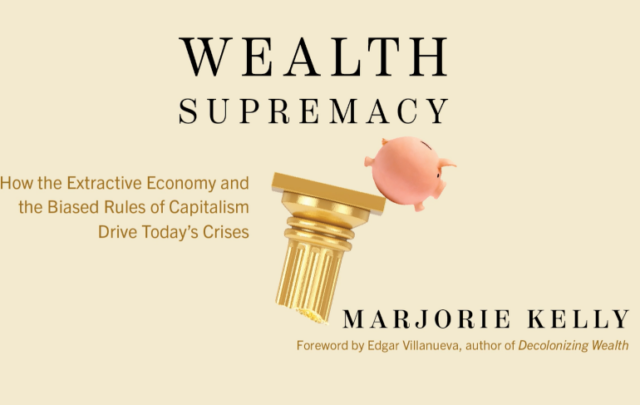Two rounds of negotiation take centre stage, about halfway through Amitav Ghosh’s new masterwork The Nutmeg’s Curse: Parables for a Planet in Crisis.
In one, US State Department and Pentagon officials win agreement that carbon emissions connected with the military are to be kept out of the Kyoto Protocol – an omission that has been preserved in international climate agreements to this day.
At the opposite end of the global power hierarchy, Khokon, a refugee from the Kishoreganj district of Bangladesh, has engaged in desperate negotiations simply to stay alive. His family’s low-lying land had been flooded for six months, followed by long droughts, hailstorms, and unseasonal downpours. The environmental degradation was followed by political depredations, as well-connected people seized increasingly scarce arable land including part of Khokon’s family’s farm. Eventually there was no better option than to sell some land and send Khokon to France – but he was quickly deported back to Bangladesh. There was no paid employment for him so after seven months of hopelessness,
“his family sold the rest of their land and paid another agent to send him abroad again. Dubai was Khokon’s chosen destination, and he paid accordingly; but the agent cheated him and he ended up in Libya instead. For the next several years he had to endure enslavement, beatings, extortion, and torture. But somehow he managed to save up enough money to pay traffickers to send him from Libya to Sicily in a ramshackle boat.” (all quoted material in this article is from The Nutmeg’s Curse by Amitav Ghosh, published by University of Chicago Press, October 2021)
Khokon was penniless, traumatized – but unlike many others he survived the voyage. Assisted by support groups for refugees and by relatives, he was able to stay in Italy and get a job at a warehouse in Parma.
How are these two sets of negotiations related? In Ghosh’s telling, the well-connected lobbyists meeting in posh board rooms, and the refugees simply trying to stay alive, each understand in their own ways how the climate crisis is intertwined with the global power structure.
The strategists at the Pentagon are fully aware that the climate crisis is a serious challenge. Yet their own ability to consume fossil fuels must not be called into question, even though the US military consumes more fossil fuel than any other organization in the world. Their own carbon emissions are not negotiable, because fossil fuel dominance is both the enabling force and the purpose of the vast web of military bases, aircraft carriers, bombers, missiles and drones through which the US exerts influence over global trade. In Ghosh’s words,
“The job of the world’s dominant military establishments is precisely to defend the most important drivers of climate change—the carbon economy and the systems of extraction, production, and consumption that it supports. Nor can these establishments be expected to address the unseen drivers of the planetary crisis, such as inequities of class, race, and geopolitical power: their very mission is to preserve the hierarchies that favor the status quo.”
Likewise, Ghosh explains, the refugees he meets in the camps around the Mediterranean are keenly aware of the realities of climate change – but they don’t think of themselves as climate refugees. If unstable weather conditions were the only challenge they faced, after all, they could simply buy a first-class ticket and fly to a comfortable new home in another country.
“What migrants like Khokon know, on the other hand, is that every aspect of their plight is rooted in unyielding, intractable, and historically rooted forms of class and racial injustice. …They know that the processes that have displaced them are embedded in very old and deeply entrenched social relationships of power, national and international.”
The exclusion of military emissions, at the very outset of international climate talks, has contributed to a tendency to see the climate crisis as techno-economic problem. Ghosh’s purpose in The Nutmeg’s Curse is to show that the climate crisis has roots as deep and as old as settler colonialism.
The conquest of Jacatra by the VOC in 1619. J.P. Coen decided in 1619 that Jakatra, later Batavia, would be a suitable base for the VOC on Java. (VOC = Vereenigde Oost Indische Compagnie, aka Dutch East Indies Company). After the conquest the whole city was razed to the ground, built anew and renamed Batavia. (File accessed via Wikimedia Commons.)
Terms of trade
“Selamon is a village in the Banda archipelago, a tiny cluster of islands at the far southeastern end of the Indian Ocean,” Ghosh writes in the book’s opening paragraphs. This village and this cluster of islands played an important role in global history due to the presence of an unusual tree – the tree that produces nutmeg and mace.
Nutmeg had been traded in many countries for many centuries, and was one of the substances most sought after and valued in Renaissance Europe. The search for nutmeg’s origins was a key driver of the wave of European explorations which eventually chanced upon the Americas.
When traders from the Dutch East India Company arrived in the Banda Islands, they quickly understood that they could multiply their profits. Trading in nutmeg was a good business, to be sure, but it would be much better if the Dutch had a tight monopoly. There was just one problem: the Bandas were already inhabited by skilled growers and traders, who had no desire to limit their business opportunities by selling only to one buyer.
The solution to the problem was simple and brutal, but was not unusual in the annals of colonialism: the Bandanese people had to be exterminated, so the Dutch could bring in slaves to harvest nutmegs, take sole control of the world-wide nutmeg trade, and sell the product for whatever the market would bear. This transfer of power took place in the early 17th century, and the profits fueled a burst of commercial and artistic development in The Netherlands which is known as The Golden Age.
“There are innumerable books on the art of the Dutch Golden Age,” Ghosh writes, but “few indeed are those that mention the Banda genocide.” He finds the story in obscure archives, told in the words of the very people who carried out the massacres. Even at the distance of four centuries, the events in Banda in April 1621 make for nightmare-inducing reading. And the events in Banda were not unique – they were part of a widespread pattern.
About the same time as the Banda massacres, Sir Francis Bacon wrote that there are “nations that are outlawed and proscribed by the law of nature and nations, or by the immediate commandment of God.” It is only right, Bacon continued, that “godly and civilized nations”, when encountering such outlawed nations, should “cut them off from the face of the earth” (quoted by Ghosh from Bacon’s An Advertisement Touching An Holy War). This call to genocide, Ghosh says, was echoed by other European “Enlightenment” figures – and enacted all too frequently through the centuries of colonial conquest and domination.
European elites also began to tell themselves that the meaning, the very reason for existence, of all the world was to become resources for human industry. Those who believed the contrary – that the land and seas, plants and animals, had their own stories and their own spirits – were clearly unfit for survival:
“To believe that the Earth was anything more than an inanimate resource was to declare oneself a superstitious savage—and that, in turn, was tantamount to placing oneself on the waiting list for extinction or extermination. Vitalism, savagery, and extinction were a series in which each term implied the next.”
Several centuries of frenzied extractivism have followed, with increasingly severe costs to earth’s ecosystems, deadly results to the indigenous peoples who were colonized, but exponential growth in wealth for the colonizers. By the time European industries learned how to exploit fossil fuels, the pattern of insatiable consumption was well established.
Today the spice trade is a minuscule part of international trade. The most valuable commodities in our era have been hydrocarbons. But these resources, too, are heavily concentrated in certain parts of the globe, and when exported must pass through a handful of maritime choke points including the Strait of Hormuz, the Strait of Malacca, and the southern tip and the Horn of Africa – “the exact locations,” Ghosh writes, “that European colonial powers fought over when the Indian Ocean’s most important commodities were cloves, nutmeg, and pepper.”
Today it is not the Dutch, nor the English, nor the Spanish, who rule the seas and set the terms of trade. But the basic order of colonialism remains, for now, intact:
“This empire may be under American control today, but it is the product of centuries of combined Western effort, going back to the 1500s.”
As in centuries past, preserving the dominant position of the empire results in immense loss of life outside the empire. In the cascading ecological catastrophes through the Middle East and South Asia, coupled with the vast numbers of civilian casualties categorized as “collateral damage”, Ghosh hears many echoes from centuries past. The “forever wars” in Iraq, Afghanistan, Somalia, and many other countries have their analogues through the long centuries of European conquest in Africa, the Americas and Asia.
The “surly bonds of earth” – or “all our relations”
The Nutmeg’s Curse is a very big book considering it weighs in at a relatively modest 336 pages. In exploring his theme Ghosh dives into Greek mythology, contemporary geopolitics, classic Dutch literature, American popular culture, the history of botanical science, all in addition to his primary focus, the colonization of several continents over several centuries. His gift for both narrative and exposition make The Nutmeg’s Curse compulsively readable.
One area in which his explanations fall short, in my view, is Ghosh’s discussion of socio-technical ramifications of energy transition. He accepts and repeats, with little apparent critique, two viewpoints that have been influential in US media in recent years: one, that since the onset of fracking the US has become energy sufficient, with no need for hydrocarbon imports; and two, that the technologies for a seamless transition from hydrocarbons to renewable energies are already available. But these arguments play a relatively minor role in the great sweep of The Nutmeg’s Curse.
The story Ghosh tells is often appalling, sickening in its portrayal of human cruelty, and frightening in what it says about the daunting challenges we face to achieve a just world through coming decades. It is also enlightening and, in the end, hopeful.
Consider these lines from a poem by Canadian-American pilot John Gillespie Magee, written shortly before his death in World War II:
“Oh, I have slipped the surly bonds of earth
And danced the skies on laughter-silvered wings.”
Magee “was almost instantly canonized as the American poet of World War II,” Ghosh writes, and these lines soon appeared on headstones throughout the United States, they were used in the midnight sign-off for many television stations, a copy of the poem was deposited on the moon in 1971, and Ronald Reagan recited the lines to dramatic effect after the space shuttle Challenger disaster. But Ghosh asks us to consider:
“What exactly is ‘surly’ about the Earth’s bonds? [W]hy should the planet be thought of as a home from which humans would be fortunate to escape?”
The deep-seated disdain for the earth was not a mere mid-twentieth-century fad. Ghosh finds the same sentiment expressed in stark terms, for example, in the work of Alfred, Lord Tennyson, “perhaps the most celebrated English poet of the late nineteenth century.” But it is an unfortunately logical outcome of a perspective that sees all the Earth, that sees Nature – soil, minerals, plants, animals, and even people – as resources to be consumed for the profit of those clever enough to dominate.
Today, Ghosh says, this earth-disdaining ethos of domination has expanded well beyond traditional colonial powers. With the global hegemony of neo-liberal economics, ruling parties in Brazil, India and China are eagerly joining the extractivist project; that is one key reason why rain forests are shrinking so rapidly, and why half of all carbon emissions from the entire industrial age have happened in just the past thirty years.
In the face of all this destruction, where can one find hope? Perhaps here, Ghosh writes: a revival of vitalist beliefs, with deep love for the sacredness of earthly spaces, is spreading in many countries. In many cases led by indigenous peoples, this vitalist revival is at the forefront of environmental struggles. He notes the legal victories, from New Zealand to South America, “that Indigenous peoples around the world have won in recent years, precisely on vitalist grounds, by underscoring the sacredness of mountains, rivers, and forests, and by highlighting the ties of kinship by which they are bound to humans.” He is inspired by Native American resistance movements which honour “the familial instinct to protect ‘all our relatives’—that is to say, the entire spectrum of nonhuman kin, including rivers, mountains, animals, and the spirits of the land.”
Is it naïve, wishful thinking, or even anti-scientific, to find hope in loving “all our relatives”? Ghosh asks that question too, and we’ll close with his answer:
“Is this magical thinking? Perhaps—but no more so than the idea of colonizing Mars; or the belief, now enshrined in the Paris Agreement, that a new technology for removing vast amounts of carbon from the atmosphere will magically appear in the not-too-distant future.
“The difference is that a vitalist mass movement, because it depends not on billionaires or technology, but on the proven resources of the human spirit, may actually be magical enough to change hearts and minds across the world.”
Photo at top of page: A Dutch men-of-war and small vessels in a breeze, by Dutch Golden Age painter Lieve Verschuier (1627–1686). Now in National Museum of Warsaw. Accessed at Wikimedia Commons.







